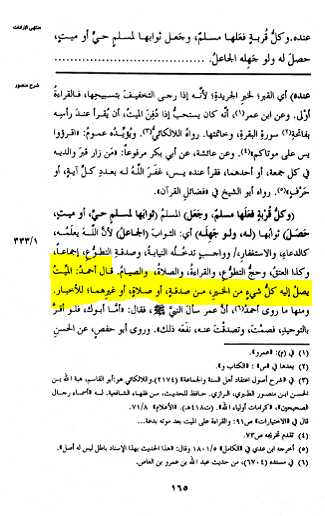بِسْمِ اللهِ الرَّحْمٰنِ الرَّحِيمِ
In a prior entry, I made a brief outline of my
position on the practice of ايصال الثواب or the offering of good deeds on behalf of someone else. It
should be clarified that this is for both the living and the deceased, in other
words, a Muslim may offer certain acts of worship and goodness and intend to
transfer its reward and benefit to another Believer who is either alive or
deceased.
Concerning the worship of
animal sacrifice and transferring its reward for the deceased, this is proven
from the act of the Prophet صلى الله عليه وآله وسلم:
عَنْ عَائِشَةَ، أَنَّ رَسُولَ اللَّهِ صلى الله عليه وسلم أَمَرَ بِكَبْشٍ
أَقْرَنَ يَطَأُ فِي سَوَادٍ وَيَبْرُكُ فِي سَوَادٍ وَيَنْظُرُ فِي سَوَادٍ
فَأُتِيَ بِهِ لِيُضَحِّيَ بِهِ فَقَالَ لَهَا يَا عَائِشَةُ هَلُمِّي
الْمُدْيَةَ . ثُمَّ قَالَ اشْحَذِيهَا بِحَجَرٍ . فَفَعَلَتْ ثُمَّ
أَخَذَهَا وَأَخَذَ الْكَبْشَ فَأَضْجَعَهُ ثُمَّ ذَبَحَهُ ثُمَّ قَالَ بِاسْمِ
اللَّهِ اللَّهُمَّ تَقَبَّلْ مِنْ مُحَمَّدٍ وَآلِ مُحَمَّدٍ وَمِنْ أُمَّةِ
مُحَمَّدٍ . ثُمَّ ضَحَّى بِهِ
The Prophet صلى الله عليه
وسلم ordered a ram
be brought to him, and he sacrificed it, praying “In the Name of Allah,
Allahumma! Accept it from Muhammad, the Family of Muhammad and the Ummah of
Muhammad.” (Sahih Muslim)
The Ummah of Muhammad
includes both the living and the deceased until Judgment Day.
Imam Abi Dawud as-Sijistani
has related a Hadith in his Sunan (#2790), under the chapter heading باب الأُضْحِيَةِ عَنِ الْمَيِّتِ (Book of
Sacrifice on Behalf of the Deceased) from Hanash that Amir al-Mu’minin Ali bin
Abi Talib رضى الله عنه sacrificed
two rams on behalf of the Prophet صلى الله عليه وسلم.
According to the Hanbali
madhhab, Ibn Qudamah has written:
وأي قربة
فعلها وجعل ثوابها للميت المسلم نفعه ذلك إن شاء الله أما الدعاء والاستغفار
والصدقة وأداء الواجبات فلا أعلم فيه خلافا
Any act of worship a person
does, gifting the reward of it to a deceased Muslim, the deceased will benefit
from it; God willing. Now, as for supplication, seeking forgiveness and giving
charity [for others], or those acts that can be fulfilled on someone else’s
behalf, I know of no difference concerning their permissibility. (al-Mughni;
v.3 p.519)
And he reaffirmed:
وهذه أحاديث صحاح , وفيها دلالة على انتفاع الميت بسائر القرب ؛ لأن الصوم
والحج والدعاء والاستغفار عبادات بدنية, وقد أوصل الله نفعها إلى الميت فكذلك ما
سواها
In these sound hadiths is a
proof that the deceased benefits by any act of worship. Now as fasting,
pilgrimage and supplicating are also bodily acts of worship, and God has
allowed their benefits to reach the deceased, then such is the case with every
other act of worship. (ibid, p.521)
Imam Ahmad himself is
reported to have said:
الميت يصل إليه كل شي من الخير من صدقة أو صلاة أو غيرهما
Any good deed, like charity,
prayer, or other than that reaches the deceased; as per the reports about it
(Sharh Muntaha al-Iradat; v.2 p.165)
Ibn Abi al-Izz has written:
واختلف في
العبادات البدنية ، كالصوم والصلاة وقراءة القرآن والذكر : فذهب أبو حنيفة وأحمد
وجمهور السلف إلى وصولها
There is a disagreement about
bodily acts of worship such as fasting, prayer, reciting Qur’an and dhikr. The
view of Abu Hanifah, Ahmad and the majority of the salaf is that the reward of
these acts reach the deceased. (Sharh Aqidat at-Tahawiyyah; v.2 p.664)
Therefore, it is my madhhab
that the offering of all supererogatory acts of worship with the intention of
transferring the reward to the deceased Believers does indeed reach and benefit
them, such as supplication, charity, animal sacrifice, pilgrimage, reading the
Qur’an, and Salat.














No comments:
Post a Comment